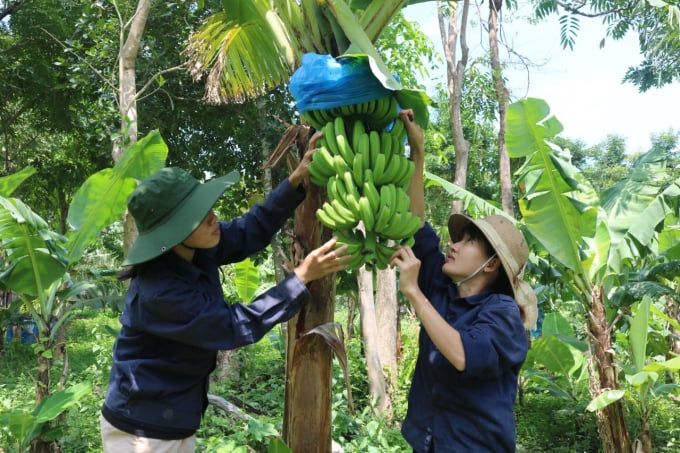May 21, 2025 | 03:17 GMT +7
May 21, 2025 | 03:17 GMT +7
Hotline: 0913.378.918
May 21, 2025 | 03:17 GMT +7
Hotline: 0913.378.918

Khanh Hoa strives that by 2030, more than 80% of rice, vegetables and fruit trees will be applied IPHM. Photo: KS.
The People's Committee of Khanh Hoa province recently issued a decision on the implementation of an action plan to promote the application of integrated plant health management (IPHM) on the main crops and key crops in the province in the period of 2023 - 2030.
Accordingly, Khanh Hoa province sets a target that by 2030, over 70% of communes will have a core group of farmers with knowledge, skills and effective application of IPHM. They also have the ability to guide other farmers to apply IPHM, evaluate the effectiveness and disseminate the results to the community.
Strive to have more than 80% of rice, vegetable and fruit areas apply IPHM; 70% of the province's key crop area serves agricultural restructuring with the application of IPHM. This includes the evaluation of the effectiveness and dissemination of the results to the community. Thereby reducing the amount of pesticides and chemical fertilizers by 30%; over 90% of communes collect pesticide packaging after use in accordance with regulations...
IPHM application aims to actively prevent plant pests, reduce input costs, reduce toxic chemicals, reduce greenhouse gas emissions, increase productivity, product quality, production efficiency, food safety assurance, environmental protection, and adaptation to climate change...
Translated by Hoang Duy

(VAN) Japan's grant aid project contributes to capacity building, promoting organic agricultural production, and fostering sustainable community development in Dong Thap province.

(VAN) For years, the CRISPR-Cas9 genome technology has been reshaping genetic engineering, a precision tool to transform everything from agriculture to medicine.

(VAN) Vietnam aims to become a 'leader' in the region in the capacity and managing effectively soil health and crop nutrition.
![Reducing emissions from rice fields: [Part 1] Farming clean rice together](https://t.ex-cdn.com/nongnghiepmoitruong.vn/608w/files/news/2025/05/05/z6509661417740_a647202949c539012a959e841c03e1d3-nongnghiep-143611.jpg)
(VAN) Growing clean rice helps reduce environmental pollution while increasing income, allowing farmers to feel secure in production and remain committed to their fields for the long term.
/2025/05/19/5136-1-144800_230.jpg)
(VAN) The Nghe An Provincial People's Committee has just approved the list of beneficiaries eligible for revenue from the Emission Reductions Payment Agreement (ERPA) in the North Central region for the year 2025.

(VAN) 14 out of 35 domesticated elephants in Dak Lak province have had their living conditions improved, with 11 of them currently participating in the non-riding elephant tourism model.

(VAN) Muong Nhe Nature Reserve hopes that being upgraded to a national park will lay the foundation for forest protection efforts to be carried out in a systematic, modern, and sustainable manner.